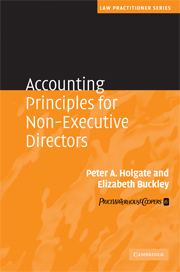Book contents
- Frontmatter
- Contents
- Acknowledgements
- Which standards and legislation has this book been based on?
- Glossary of terms
- Part I The accounting environment
- Part II Some specifics
- 8 Individual entity and consolidated financial statements
- 9 Presentation of financial statements
- 10 Earnings per share
- 11 Mergers and acquisitions
- 12 Interaction of accounting with tax
- 13 Assets
- 14 Liabilities
- 15 Leases
- 16 Pensions
- 17 Financial instruments
- 18 Share-based payment
- 19 Realised and distributable profits
- 20 Disclosures in published annual reports
- Appendices
- Index
18 - Share-based payment
from Part II - Some specifics
Published online by Cambridge University Press: 02 November 2009
- Frontmatter
- Contents
- Acknowledgements
- Which standards and legislation has this book been based on?
- Glossary of terms
- Part I The accounting environment
- Part II Some specifics
- 8 Individual entity and consolidated financial statements
- 9 Presentation of financial statements
- 10 Earnings per share
- 11 Mergers and acquisitions
- 12 Interaction of accounting with tax
- 13 Assets
- 14 Liabilities
- 15 Leases
- 16 Pensions
- 17 Financial instruments
- 18 Share-based payment
- 19 Realised and distributable profits
- 20 Disclosures in published annual reports
- Appendices
- Index
Summary
Introduction
This chapter considers the accounting treatment required when a company issues share options or share awards as part of an employee's remuneration package or as consideration for any other goods or services received. It also considers the accounting required when a company issues any other form of consideration, for goods or services, which is calculated by reference to the company's share price, for example, phantom share options issued as part of an employee's remuneration package.
Issuing share options and granting other long-term incentive plans as part of an employee's remuneration package, in particular for executive directors, has long been a common practice in the UK. During the ‘dotcom’ boom, the practice was extended and it became common, for dotcom companies at least, to issue share options and shares, rather than cash, to non-employees as consideration for goods or services. In terms of employee remuneration, it is also now a widely accepted practice to make payments, as part of a long-term incentive scheme, that are in the form of cash, but which are calculated by reference to the growth in the company's share price.
Controversy, however, has surrounded the appropriate accounting treatment. Many have argued that, for share options and other share awards, there is no cost to the company itself; the ‘cost’ is to the shareholders who suffer a dilution in their share of the company. Consequently, the proponents of this view argue that the appropriate place to reflect these transactions is in the calculation of earnings per share and that there should be no charge in arriving at profit/loss.
- Type
- Chapter
- Information
- Accounting Principles for Non-Executive Directors , pp. 171 - 178Publisher: Cambridge University PressPrint publication year: 2009



